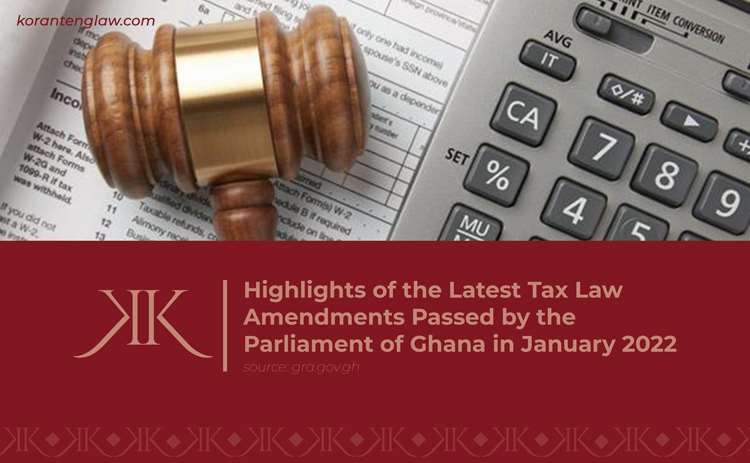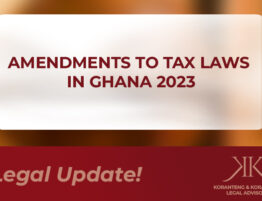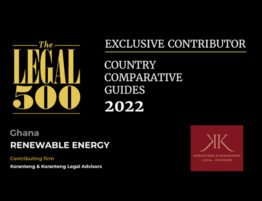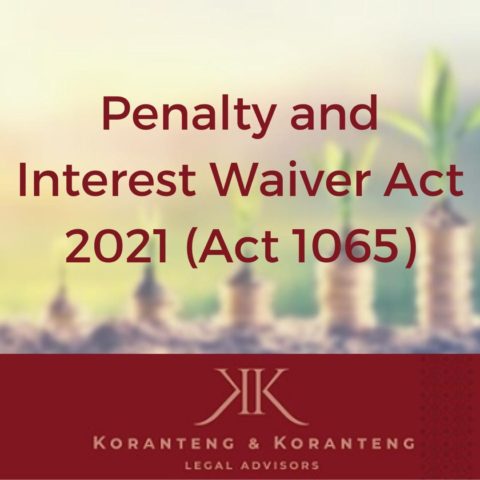
Highlights of the Latest Tax Law Amendments Passed by the Parliament of Ghana in January 2022
The Commissioner-General of the Ghana Revenue Authority (GRA) has notified the general public that the following tax law amendments have been duly passed by Parliament:
- Income Tax (Amendment) (No. 2) Act, 2021 (Act 1071)
- Value Added Tax (Amendment) Act, 2021 (Act 1072)
- Penalty and Interest Waiver (Amendment) Act, 2021 (Act 1073)
Each of the above amendments came into force on 1 st January, 2022.
1. Penalty and Interest Waiver (Amendment) Act, 2021 (Act 1073)
The Waiver of Penalties and Interest for outstanding debt owed to the GRA as at 31 st December, 2020 under the Penalty and Interest Waiver (Amendment) Act, 2021 (Act 1073) has been extended to 30 th June, 2022.
The amendment of Act 1073 was passed as part of the Government of Ghana’s support to taxpayers during the COVID-19 pandemic. It is intended to cushion such
taxpayers in meeting their tax obligations in a manner that will support them in their recovery from the impact of the pandemic.
Act 1073 extends the 30 th September 2021 deadline for the application for a waiver of penalties and interests on accumulated tax arrears \for persons who make
arrangements with the GRA to pay the principal tax amount, up to 30 th June 2022.
CONDITIONS FOR THE WAIVER OF THE PENALTY AND INTEREST
Under Act 1073 a person qualifies for the waiver of penalty or interest where, on or before 30 th June 2022, the person:
- Submits returns or amended returns, containing full disclosure of undisclosed liabilities through 31 st December 2020 and pays or makes the necessary arrangements to pay all resulting taxes; OR
- Pays or make the necessary arrangements to pay assessed and outstanding taxes (to the GRA).
For taxpayers who take advantage of the above extended deadline, the Commissioner – General shall not recover assessed penalties and interest on the tax paid or due, nor shall he commence prosecution or an enforcement action in respect of such a person (individuals and companies).
2. Income Tax (Amendment) (No. 2) Act, 2021 (Act 1071)
(a) The rate of withholding tax for the sale of unprocessed precious minerals has been reduced by 50%, i.e. from 3% to 1½%.
(b) The maximum turnover of individuals who qualify for presumptive tax under the Second Schedule to the Income Tax Act, 2015 (Act 896) has been increased to Five Hundred Thousand Ghana Cedis (GH₵500,000). Presumptive tax applies where the chargeable income of a resident individual for a year of assessment consists exclusively of income from a business, the income is exclusively from sources within Ghana and either, the individual is not registered for Value Added Tax (VAT) purposes and has an annual turnover of not more than twenty thousand Cedis from the business or they are not required to register for VAT purposes and have an annual turnover of more than twenty thousand Cedis from the business. The annual turnover is computed as an average of the turnover for three consecutive years ending in the year of assessment.
(c) The Vehicle Income Tax (VIT) for commercial transport vehicles was suspended by the Government of Ghana in March 2021. These commercial transport vehicles have been listed in the 2 nd Schedule of the Income Tax Regulations, 2016 (L.I.2244) under separate classes from Class A to Class D. They include taxi’s,trotro’s, tipper trucks and commuters. Under the Income Tax Act, the suspension of VIT payment for selected vehicles has been extended to cover the 1st and 2nd quarters of 2022. In addition, commuter vehicles in categories C1, C2, C3, C5, C7 and C9 have been included in the list of vehicles for the dispensation. Such vehicles are as follows:
- C1 – Commuters capable of carrying up to 15 persons.
- C2 – Commuters capable of carrying from 16 to 19 persons.
- C3 – Ford buses and Commuters capable of carrying up to 23 persons.
- C5 – Commuters capable of carrying up to 38 persons.
- C7 – Commuters capable of carrying from 39 to 45 persons.
- C9 – Tour Operators capable of carrying above 45 persons.
(d) The suspension of income tax payments for selected self-employed individuals, using the Tax Stamp system has been extended to cover the 1st and 2nd quarters of 2022. The Income Tax Stamp is designed for individuals operating in the informal sector, for example, small-scale self-employed dressmakers / tailors, hairdressers / barbers, susu collectors, chop bar owners, hawkers etc. The Income Tax Stamp amount ranges from GH₵3 to GH₵45 and is paid on a quarterly basis. Self-employed individuals, obligated to purchase a Tax Stamp under the Tax Stamp system, i.e. make this quarterly income tax installment payment, have been granted exemptions for the 1 st and 2 nd quarters of 2022. An operator in the informal sector, under the Tax Stamp system, must ordinarily buy the tax stamp on or before 15th January, 15th April, 15th July, and 15th October of each year.
3. Value Added Tax (Amendment) Act, 2021 (Act 1072)
(a) The Value Added Tax (VAT) flat rate for retailers of goods has been restricted to taxpayers whose annual turnover is Two Hundred Thousand Ghana Cedis (GH₵200,000) and above, but not exceeding Five Hundred Thousand Ghana Cedis (GH₵500,000).
(b) The Value Added Tax zero-rating dispensation on African textile prints produced by local textile manufacturers has been extended to 31 st December, 2023.




